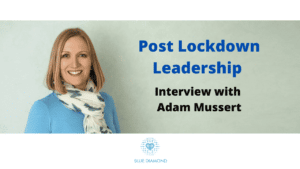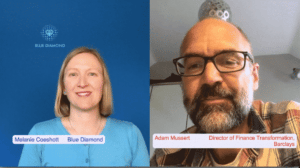
This interview with Adam Mussert forms part of the Blue Diamond Post Lockdown Leadership Review.
We discuss what great leadership looks like, how to practice self-leadership, and leadership traits for career success.
In addition, we look at anticipated changes in working practices and key skills for success in the post-lockdown economy.
Watch the interview with Adam Mussert here

Melanie Coeshott (MC) – Good afternoon Adam. Thank you very much for agreeing to talk to me today. So, we worked together many years ago, and although in different teams, I always admired the way that you led your teams and interacted with others.
Now, today, you’re in the position of Director of Finance Transformation and I know that over the last decade or so you’ve had a number of other senior leadership positions as well.
Adam Mussert (AM) – Thank you very much for involving me.
What does great leadership mean to you?
AM – in reflection on this, I’ve thought a lot about the people I’ve worked for, the people who’ve been leaders in the organizations I’ve worked for and thought about what really made a difference for me. And it has become apparent to me over the years that the quality of my manager and the leader of my function is really important to me.
So, I’ve identified 4 main things that come to mind:
Having a clear vision of where they want their team, their function, or their organization to go. And a clear path to get there. I think that clarity is really important in a leader.
Connected to this, is having the ability to communicate that vision, that roadmap, in a way that really connects with people. Because they also need to be able to take people with them. And taking people with you and the ability and willingness to be led by you is part of creating that engagement and instilling that motivation in people.
But it’s also another quality which is having an awareness and empathy for people. It’s not just about compelling people to be part of your team, but actually winning their hearts and minds, so they want to be a part of where you’re going. If they buy into your vision and the way you’ve articulated it: you have the ability to get the best out of those individuals.
Then I think there’s another piece that is following that vision. That path isn’t always easy, so there needs to be resilience and on occasion courage. Either to keep going when it gets tough or sometimes have the courage to stop, take stock, and consider whether things have changed or you were wrong. And then having the courage to make those decisions or acknowledge those situations.
And I think these are all signs of great leadership.
MC – Great. There are some great traits coming out there, thank you for that.
What do you interpret by self-leadership and how do you practice it?
AM – That’s an interesting one because I don’t necessarily think about self-leadership. However, I definitely think a lot these days about self-awareness and that was the first thing I considered here.
I’m not quite sure how I think about leadership related to self, but in terms of how you can operate most effectively, I think being aware of yourself and really understanding what makes you tick, understanding what excites you, what motivates you, and understand what your triggers and your blockers are. I think this is a really critical part of being effective.
There are some things I’ve been much more aware of these last four or five years. These include what makes me tick, and what are the things that I need to be aware of (and there are some big things to be aware of) but also there is that awareness at the moment when something has suddenly shifted one’s mood. So, I think self-awareness is a very important point.
And the next thing I thought about in terms of self-leadership is about being really clear on what my priorities are. Whether it’s self-leadership for me or more generally, it’s important to know what your priorities are, and what’s important.
It can be quite easy to get swept along by what’s important to other people and take time to think about what’s important for you.
Looking at the situation we’re in now, which is really quite interesting, a lot of people are reconsidering what’s important for them because the world order has shifted substantially and this creates a different environment, a different work environment, different family environments, social environments, etc.
This often brings into sharp relief what one’s priorities are.
And the last point that springs to mind is having the confidence to pursue those priorities. And that comes back to the last point in that it’s often easy to be swept along by other people’s priorities and an organization’s priorities. and that’s not necessarily a bad thing if you’re aligned with that organization and they’re paying you…but sometimes it takes a brave person that sees a disconnect and then does something about it.
MC – Great. Some great answers there. Thank you
What kinds of signs of leadership do you look for from staff?
AM – This one relates more to previous roles than now when I’ve been in positions of responsibility.
When you’re in that situation, you clearly love it when people around you take initiative. It’s just fantastic when people put their hand up when they say they want to get involved in stuff, so that willingness to take initiative, to take responsibility.
It’s a really powerful marker, I think, of the people who naturally have the confidence to lead, so I think that’s really key.
The other quality that’s always interesting to observe is to what extent they are respected by their peers, people above them, and people below them. And often people’s skill sets in managing those relationships could be quite different in those different dimensions: up, besides, and down. And I think leading is about being really good at managing in all those directions, not just managing upwards to the detriment of the relationship with the people beneath them.
So, I think that ability to be respected and to take people with you is another really key marker.
And then there is something around people seeming to thrive in different situations i.e. when they take new things on. Some people can be slightly cowed by it and maybe never volunteered for it in the first place: maybe it was thrust upon them. I think it’s knowing whether someone is thriving in that environment and rising to that challenge or whether they’re doing it because they want desperately to progress and feel that this is a stage they have to go through. I guess it’s about knowing your people and whether it’s the right move for them, the right position for them to be in.
MC – Right. So, obviously, we’ve gone through a period of a lot of change over the last two months. and yet this is probably not the end of it: there is possibly going to be a lot more change to come.
What do you anticipate in terms of changes in working practices in the next twelve months and beyond?
AM – Yeah, it’s interesting, isn’t it? I think everyone’s spending quite a bit of time reflecting on and trying to foresee where we go as we emerge from this and what the world will look like afterward.
This is a painful situation for many people, but for others, this is creating opportunities, and they’re seeing situations that they’d quite like to continue. So, I think. everyone is being asked to be more flexible now.
I just imagine that the whole concept of working from home – how many of us have needed to work and will need to work for some time – will prompt some organizations to question whether they need to pay a lot for real estate in prestigious locations. I normally work in Canary Wharf, or I did. I wonder how that will all change in the years to come.
So, the keyword I keep coming back to is flexibility in terms of people. Organizations may be thinking that now they’ve got the infrastructure in place that enables them to work flexibly, does that open the door to a different way of working, where remote working becomes less of an exception and more the norm? Whereas previously people maybe worked 10 or 20% of their time flexibly from home, that could shift substantially.
MC – Absolutely.
How are you going to manage yourself and others through this change?
AM – In terms of managing myself, because of where I live and how I live, I’m feeling the benefits of this, and that may sound a little selfish when so many people are suffering. For me, working flexibly and working from home is a real benefit, because I had a long-distance commute and it means I don’t have to stay away from home and I don’t have to spend as much time traveling. So, I’d like to think I could take some of that with me when all this lifts and shifts.
In terms of managing others, I think the key thing to be aware of is that everyone’s circumstances are different. So, I’ll try to listen, understand and observe – with colleagues around me and people that work for me, and to consider “what’s working for them and what doesn’t work for them?”. My experience could well be different from other people’s and there will be people who will be desperate to get back to the way of working they had before, and others may want to take the opportunity to work differently. So, a lot of it is about listening to people and understanding how they experience this but also just giving everyone space to reacclimatise.
I don’t know what it’ll be like going back to an office environment, none of us really do, having been away from it for a long time. So, it would be quite interesting to just give people space to the reacclimatise, myself included.
MC – Yes indeed.
What skills do you perceive to be the most important to help us through this period?
AM – Some of the things I’ve already touched on, I guess.
That sense of openness and awareness of how people have been affected by everything and how they want to come back to work really.
Maybe a bit of creativity because people have needed to embrace this throughout this period: how they work, what times they work, how they fit in other commitments they’ve got within their families. So maybe some of those creative juices will be useful to take with them as they go back into the workplace, as well as flexibility.
I’ve been focusing on the soft skills, but many organizations will have been significantly impacted by this, meaning some different harder skills may be necessary in terms of reprioritizing the work they need to do, the services they need to deliver, establishing relationships with clients and stakeholders, etc. There may also need to be some tough economic decisions.
I think there will need to be a fair dose of resilience as well as people face up to that reality.
MC – Great. Thank you so much. It’s been great to talk to you today and learn some of your insights. I hope to catch up with you again soon.
Thanks to Adam Mussert, Director of Finance Transformation, at Barclays

Thanks for reading. Check out other Blue Diamond articles to help you take control of your work and life.
Check out the other interviews in the Post Lockdown Leadership Review series
